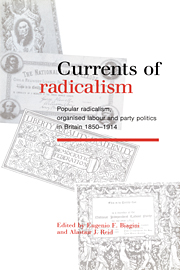 Currents of Radicalism
Currents of Radicalism Book contents
- Frontmatter
- Contents
- Notes on contributors
- Preface
- 1 Currents of radicalism, 1850–1914
- Part I Continuities in popular radicalism
- 2 The old radicalism and the new: David Urquhart and the politics of opposition, 1832–1867
- 3 Radicalism and popular culture: the Tichborne case and the politics of ‘fair play’, 1867–1886
- 4 Popular politics and the limitations of party: Wolverhampton, 1867–1900
- 5 Nonconformity and trade unionism: the Sheffield outrages of 1866
- Part II The Liberal party and the people
- Part III Radicals, Liberals, and the Labour party
- Index
2 - The old radicalism and the new: David Urquhart and the politics of opposition, 1832–1867
from Part I - Continuities in popular radicalism
Published online by Cambridge University Press: 07 September 2010
- Frontmatter
- Contents
- Notes on contributors
- Preface
- 1 Currents of radicalism, 1850–1914
- Part I Continuities in popular radicalism
- 2 The old radicalism and the new: David Urquhart and the politics of opposition, 1832–1867
- 3 Radicalism and popular culture: the Tichborne case and the politics of ‘fair play’, 1867–1886
- 4 Popular politics and the limitations of party: Wolverhampton, 1867–1900
- 5 Nonconformity and trade unionism: the Sheffield outrages of 1866
- Part II The Liberal party and the people
- Part III Radicals, Liberals, and the Labour party
- Index
Summary
Few enigmas have survived intact from as much study as David Urquhart (1805–77). Despite being the subject of a biography, a doctoral thesis and several monographs, it is still the eccentric side of Urquhart's character and the irrational and obsessive nature of his following which continue to constitute his chief historical significance. Studies of Urquhart himself have tended to concentrate on his Russophobia, his lifelong preoccupation with the ‘secret’ diplomacy of Lord Palmerston and his messianic aspirations towards leading an enlightened working class. Accounts of the movement which Urquhart inspired – the ‘working-men's’ foreign affairs committees of the 1850s – have faithfully reproduced this particular focus, emphasising, inter alia, their proliferation during the Crimean war, their doctrinal belief in Palmerston's diplomatic duplicity and their complete subservience to Urquhart's Tory demagoguery. In a few of these studies there has been some attempt to offer a more structural explanation for the Urquhart movement – as a response to the anomie of a ‘complex industrialising society’ (Salt); as a form of natural religion (Shannon); and, most persuasively, as an integral part of a backward-looking radicalism peculiar to the 1850s (Anderson). However, the overall effect has been one of isolation. Historical fashions come and go, yet Urquhart and the ‘working-men's’ foreign affairs committees remain a phenomenon set apart from and almost immune to the historiography of mid nineteenth-century England.
One of the main sources of this puzzle has been Urquhart himself.
- Type
- Chapter
- Information
- Currents of RadicalismPopular Radicalism, Organised Labour and Party Politics in Britain, 1850–1914, pp. 23 - 43Publisher: Cambridge University PressPrint publication year: 1991
- 4
- Cited by


